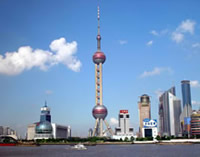|
|


ADVERTISEMENT
Buy Your own advertising
spaces!
.
Download Adobe Acrobat Reader to open [PDF] files.
Recent Visitors
Urban transformation for 'better life'
2010. 3 June
(english.peopledaily.com.cn)
Hundreds of officials from government join leaders in academia and business from some 180 cities and 38 countries and regions in Shanghai today to explore how progressive cities are transforming to meet 21st century demands.
The two-day SmarterCities Shanghai Forum - with more than 800 participants representing government, education, financial services, retailing, distribution, transportation, healthcare and energy - will discuss the challenges and opportunities in today's unprecedented level of globalization and urbanization.
IBM and guest speakers will lead the discussion and share examples of how information technology has improved infrastructure and systems to make cities better places to live.
In 2007, more than half of the world's population lived in urban areas. By 2050, that figure will rise to 70 percent of the Earth's population - growing from 3.3 billion people today to a breathtaking 6.4 billion.
The wave of urbanization presents enormous challenges and opportunities for much of humanity - but especially to city leaders, and especially now, as consensus for change emerges, now driven by economic necessity and environmental concern.
It is no coincidence that Shanghai was selected by IBM to hold the SmarterCities Forum. The Shanghai Expo 2010's theme of "Better City, Better Life" - representing the common dream of all people for a better urban environment in the future - offers opportunities for discussion and showcases real life examples about the future of a modern city.
Practices and experiences will be shared among city leaders and experts, as will measures to accelerate urbanization, gain support from both city administration and citizenry, and attract investment for a smarter urban ecosystem.
"It is imperative for city administrations to understand how they can make the best use of IT to improve city management and keep up with rapid urbanization," said D.C. Chien, chairman and CEO of IBM Greater China Group. "Only by doing so can China transform itself into a modern information society progressing in a guided manner."
"Building smarter cities fits in well with the Chinese government's scientific urban development guidelines and will contribute to the country's overall harmonious development," he added.
Smarter city initiatives treat the city as an ecosystem comprised of multiple subsystems to manage transportation, energy, commerce, communications and water resources. The subsystems come together to form an interconnected, synergistic whole.
Due to technological limitations, subsystems in previous city developments could not offer integrated information support to development.
In the future, leveraging the Internet of Things - cloud computing, business analysis optimization and other information technologies - the physical, information, social and commercial infrastructures of cities can be interconnected to bridge gaps between geographical areas and subsystems.
A smarter city enables information sharing and collaboration among different municipal governmental agencies and systems so that resources are used rationally, decisions are made that best benefit city development and management, and emergencies and disasters are predicted and dealt with in the shortest possible time.
China Daily
Source: english.peopledaily.com.cn


